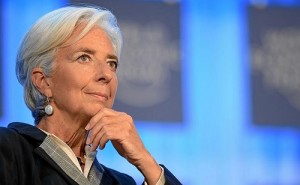
GCC fiscal balances will post a deficit of up to 12.7% of GDP in 2015, with export revenues expected to be nearly $275 billion lower this year, compared to 2014.
The warning was made by IMF managing director Christine Lagarde, speaking to the GCC Financial and Economic Cooperation Committee during the Joint Meeting of GCC Ministers with central bank governors in Doha.
Lagarde said: “I am pleased for the opportunity to attend the GCC meeting and meet the finance ministers and central bank governors of the Gulf countries to discuss the outlook for the region. The meeting is an important platform for policymakers to address problems in a cooperative way.
“During the meeting, we exchanged views on the challenges facing the global economy and the GCC region, and the policy responses needed,” she added.
She pointed that a large share of fiscal and export revenues in the GCC come from oil saying that with oil prices having declined sharply since mid-2014, export revenues are expected to be nearly $275 billion lower in 2015 than in 2014.
“The fiscal and current account balances in the region are deteriorating sharply, with the fiscal balance projected by the IMF to be in a deficit of 12.7% of GDP in 2015. Growth is also expected to slow, with IMF projection suggesting 3.2% in 2015 and 2.7% in 2016, compared to 3.4% in 2014,” she added.
On the oil prices, Lagarde highlighted that GCC countries face the challenge of lower oil prices from a position of strength.
She explained that prudent policies over the past decade have enabled them to build up financial buffers which avoid the need for a sudden or disruptive adjustment in fiscal policy. Nevertheless, with low oil prices expected to persist for a number of years, all GCC countries need to undertake some degree of fiscal adjustment, although the size and urgency of this adjustment varies across countries. Well-planned fiscal consolidation strategies need to be put in place as soon as possible and communicated so that people understand how the adjustment will take place, she said.
She went on saying that the best to carry out this fiscal adjustment will depend on each country’s specific situation.
But the main elements are common across countries: an expansion of non-oil tax revenues; raising energy prices which are still well below international norms; firm control of current spending, particularly on public sector wages; and a review of capital expenditures. Reforms to strengthen the fiscal frameworks would support these consolidation efforts.
Regarding finance, the IMF Director said that the “Banking systems in the GCC generally appear well-placed to weather lower oil prices, weaker growth, and higher U.S. interest rates. Nevertheless, as oil revenues decrease, external financing conditions tighten, and government debt issuance increases, central banks will need to remain vigilant for stresses in the system and provide liquidity to the financial sector if needed. Macroprudential policy can also help manage any systemic stresses in the financial system if they were to emerge.
“Governments should continue to take steps to switch the focus of growth away from the public and toward the private sector. With some 2 million people likely to enter the labor force in the GCC by 2020, and given the fiscal constraints on further increasing government employment, private sector job creation needs to be stepped up. Governments are already implementing many policies in this direction, and important progress is being made. Nevertheless, continued efforts are needed to encourage nationals to seek employment in the private sector and for firms to hire them.
She stressed that the IMF will continue to deepen its relationship with the GCC through regular country visits, technical assistance, and training. “We stand ready to support the GCC countries in any way they see appropriate as they address the challenges of lower oil prices,” she said.
Concluding, IMF Director said “I thank HE Ali Sharif Al Emadi, Minister of Finance for Qatar, for chairing the GCC meeting and for his government’s generous hospitality. I also thank Dr. Abdul Latif bin Rashid Al-Zayani, the GCC Secretary General.”
Source: Qatar news agency












